
Oh, man, @kilmeade is *so* close to getting it.
I'll see if I can help him understand why "that narrative flipped" in the 1960s.
I'll see if I can help him understand why "that narrative flipped" in the 1960s.
https://twitter.com/revrrlewis/status/1144569693044391942
First of all, yes, the Democratic Party *was* the party of slavery and segregation for most of the 19th century and the early 20th century. And yes, the Republican Party in Lincoln's era was the party of civil rights!
Welcome to 10th grade American History! You seem new here.
Welcome to 10th grade American History! You seem new here.
Those clear lines set down at the start of this "narrative" quickly became blurred.
Here's the Cliff Notes version of the story, if you've somehow never read it:
Here's the Cliff Notes version of the story, if you've somehow never read it:
https://twitter.com/KevinMKruse/status/991131182418092034
During the early 20th century, the parties stances on civil rights became a bit muddied, as the Republicans got a little worse and the Democrats got a little better.
The 1920s Klan is a good snapshot, as both parties had their ties to it. See here:
The 1920s Klan is a good snapshot, as both parties had their ties to it. See here:
https://twitter.com/KevinMKruse/status/941048303709540352
For the Democrats, the real start of the change in the "narrative" came with the party's strong embrace of civil rights as a national cause under Truman in 1947-1948 and the subsequent Dixiecrat revolt:
https://twitter.com/KevinMKruse/status/991131192236888064
Yet, on the surface, the GOP still had a much better claim to being "the party of civil rights" in the 1950s:
Earl Warren delivered the Brown decision, Eisenhower sent troops to Little Rock to desegregate Central High, and his Attorney General pushed the 1957 Civil Rights Act.
Earl Warren delivered the Brown decision, Eisenhower sent troops to Little Rock to desegregate Central High, and his Attorney General pushed the 1957 Civil Rights Act.
Eisenhower was reluctant to push on civil rights, though.
After Brown, he called Warren "the biggest damfool mistake I ever made" and refused speak out forcefully for the decision. He intervened in Little Rock only when his own authority was challenged by the Dem governor. Etc.
After Brown, he called Warren "the biggest damfool mistake I ever made" and refused speak out forcefully for the decision. He intervened in Little Rock only when his own authority was challenged by the Dem governor. Etc.
NAACP leader Roy Wilkins summed up the attitude of many African Americans when he later reflected: “President Eisenhower was a fine general and a good, decent man, but if he had fought World War II the way he fought for civil rights, we would all be speaking German now.”
That's where things stood at the start of the 1960s.
In 1960, Ike's VP Richard Nixon -- who'd been stronger on civil rights -- was the GOP nominee and the GOP platform was quite forceful on civil rights too: presidency.ucsb.edu/documents/repu…
That year, Nixon won 32% of the black vote.
In 1960, Ike's VP Richard Nixon -- who'd been stronger on civil rights -- was the GOP nominee and the GOP platform was quite forceful on civil rights too: presidency.ucsb.edu/documents/repu…
That year, Nixon won 32% of the black vote.
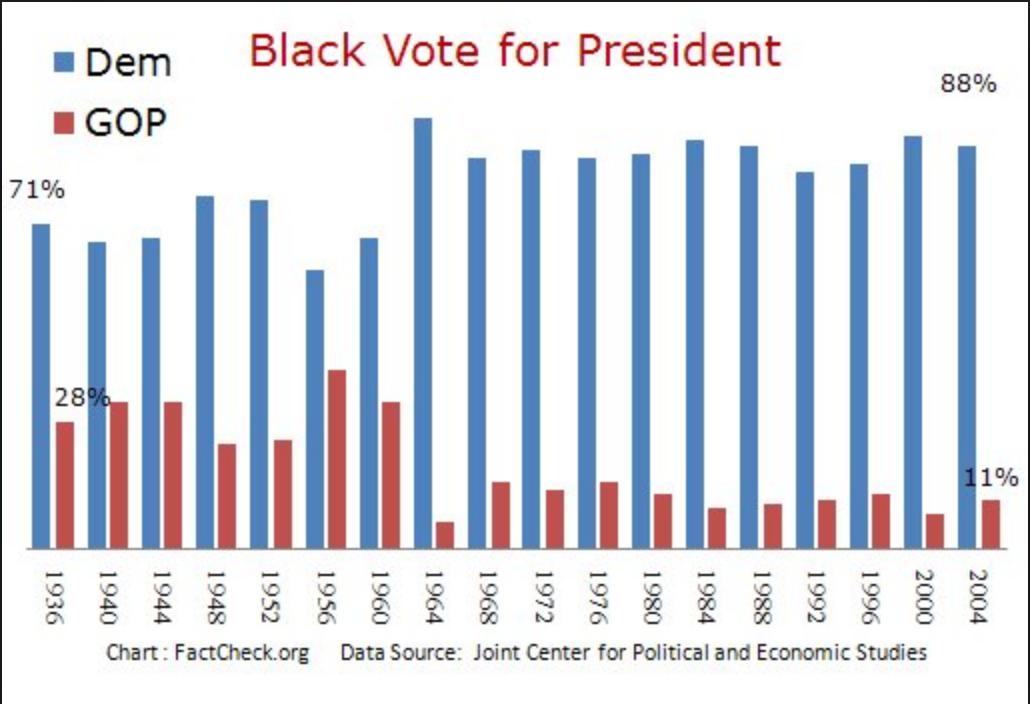
Now, @kilmeade, if you look closely at that image, you'll see the moment when the "narrative flipped" on the parties and civil rights, as most of the remaining black voters in the GOP walked away.
In 1960, the GOP nominee got 32% of the black vote. In 1964, it fell to 4%.
In 1960, the GOP nominee got 32% of the black vote. In 1964, it fell to 4%.

Here's another graph, in case that one's not clear.
Check out @pbump's article too: washingtonpost.com/news/the-fix/w…
Check out @pbump's article too: washingtonpost.com/news/the-fix/w…
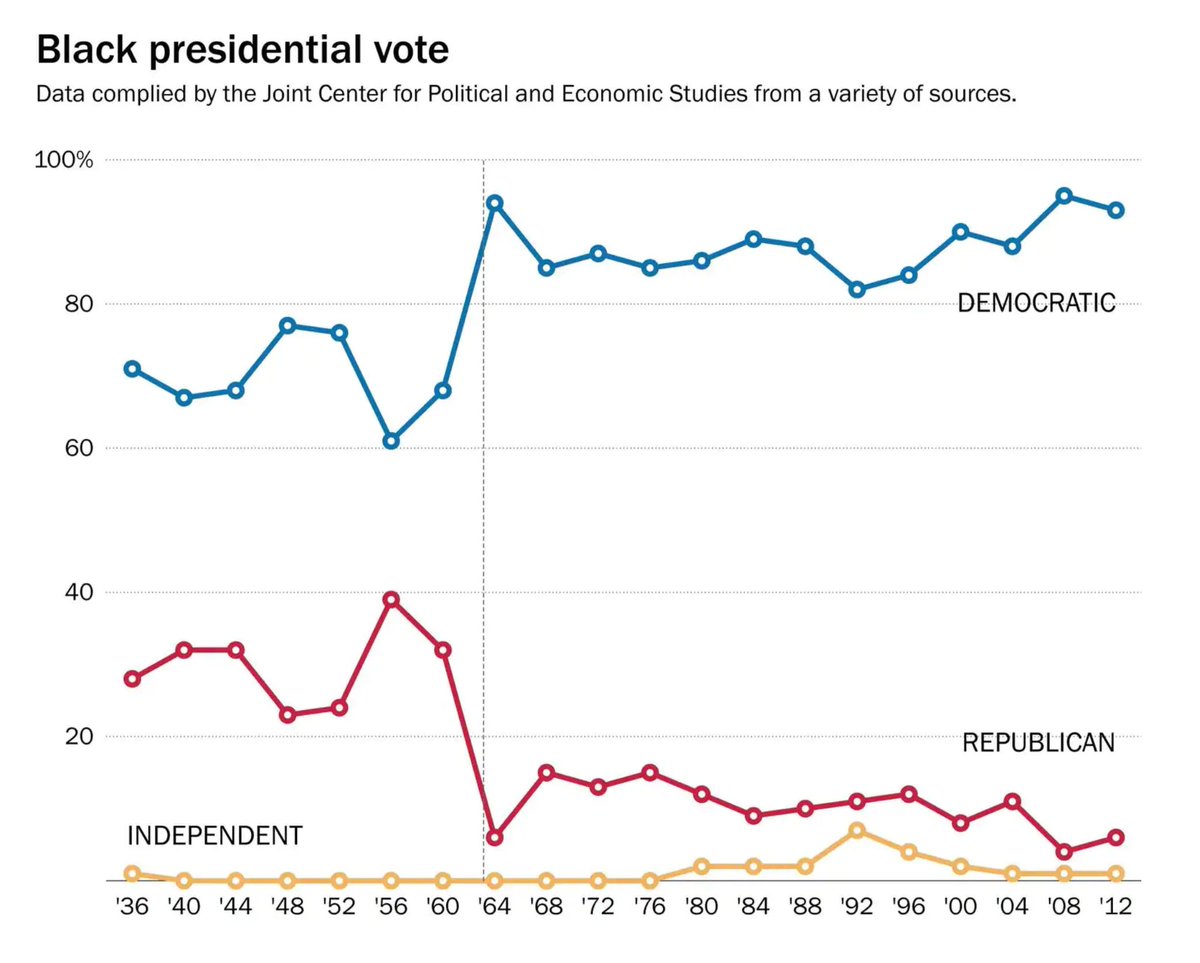
What happened in between 1960 and 1964 to "flip the narrative"?
Well, part of it was that, at the national level, the Democrats finished the long journey Truman started them on and finally came out strongly in support of civil rights:
Well, part of it was that, at the national level, the Democrats finished the long journey Truman started them on and finally came out strongly in support of civil rights:
https://twitter.com/KevinMKruse/status/991466976282337280
Meanwhile, Republicans were moving in the opposite direction.
There were still a good number of liberals and moderates in the party (seen in their votes for the Civil Rights Act, etc.) but conservatives who opposed civil rights legislation were getting the upper hand.
There were still a good number of liberals and moderates in the party (seen in their votes for the Civil Rights Act, etc.) but conservatives who opposed civil rights legislation were getting the upper hand.
This was clear in the 1964 contest. The Democrat, President Lyndon Johnson, had pushed for the Civil Rights Act; the GOP nominee, Sen. Barry Goldwater, had voted against it.
Martin Luther King Jr., who had remained aloof from partisan politics, publicly denounced his candidacy.
Martin Luther King Jr., who had remained aloof from partisan politics, publicly denounced his candidacy.
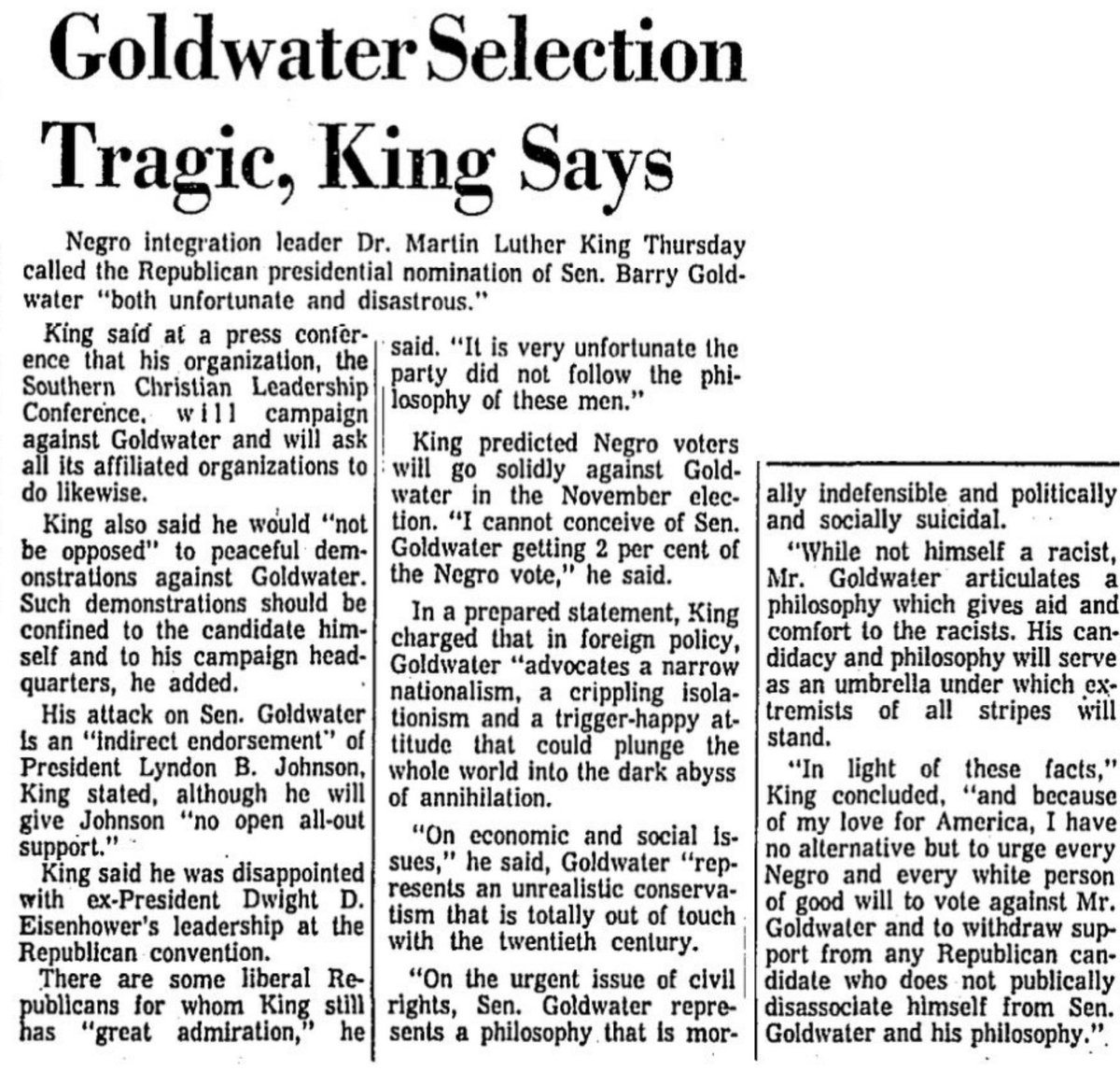
It wasn't just Goldwater, though.
As @LeahRigueur has shown in her brilliant book, at the 1964 GOP convention, some black delegates were barred from attending, while others were harassed.
One black man had his suit set on fire. "Keep in your own place," his attacker yelled.
As @LeahRigueur has shown in her brilliant book, at the 1964 GOP convention, some black delegates were barred from attending, while others were harassed.
One black man had his suit set on fire. "Keep in your own place," his attacker yelled.
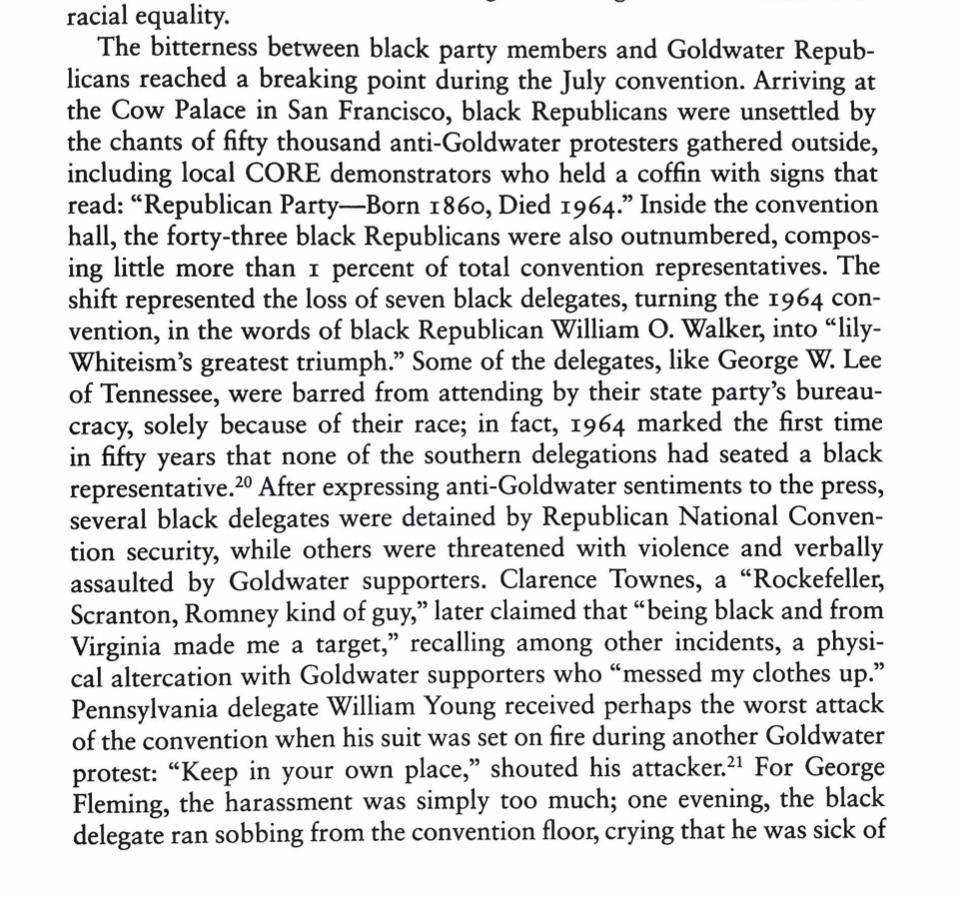
The 1964 Republican National Convention was so racially ugly that Jackie Robinson, a lifelong Republican, said "I now believe I know how it felt to be a Jew in Hitler’s Germany.”
(From @mattdelmont's piece here: theatlantic.com/politics/archi…)
(From @mattdelmont's piece here: theatlantic.com/politics/archi…)
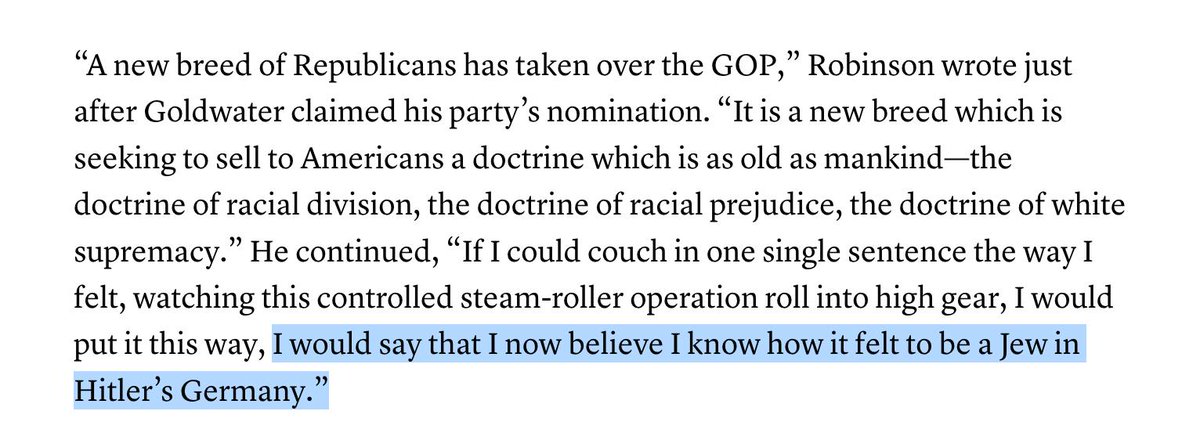
The Republican party platform drawn up at that convention showed the change on civil rights too.
In 1960, a long, detailed section on civil rights (1257 words). In 1964, only a few vague lines (132 words)
presidency.ucsb.edu/documents/repu…
presidency.ucsb.edu/documents/repu…
In 1960, a long, detailed section on civil rights (1257 words). In 1964, only a few vague lines (132 words)
presidency.ucsb.edu/documents/repu…
presidency.ucsb.edu/documents/repu…
In case the shift wasn't clear enough, a few months later in September 1964, Strom Thurmond -- who had been the Dixiecrat protest candidate when Truman embraced civil rights -- left the Democrats and was welcomed by the Republicans. 

George Wallace, meanwhile, had offered to switch parties too, but only if Goldwater tapped him as his vice-presidential running mate.
Here's a thread on that story:
Here's a thread on that story:
https://twitter.com/KevinMKruse/status/992093684781862912
Wallace's switch didn't happen, though, and most Southern Democrats in Congress stayed put too.
A new generation of Southern Republicans, however, made it clear that they were aligned with segregation:
A new generation of Southern Republicans, however, made it clear that they were aligned with segregation:
https://twitter.com/KevinMKruse/status/993475118058926080
As a result of these changes, African American voters concluded that the old narrative about Republicans being "the party of Lincoln" was dead and gone.
And so did Americans in general. @edsall captures the abrupt shift in public attitudes and polling data here:
And so did Americans in general. @edsall captures the abrupt shift in public attitudes and polling data here:
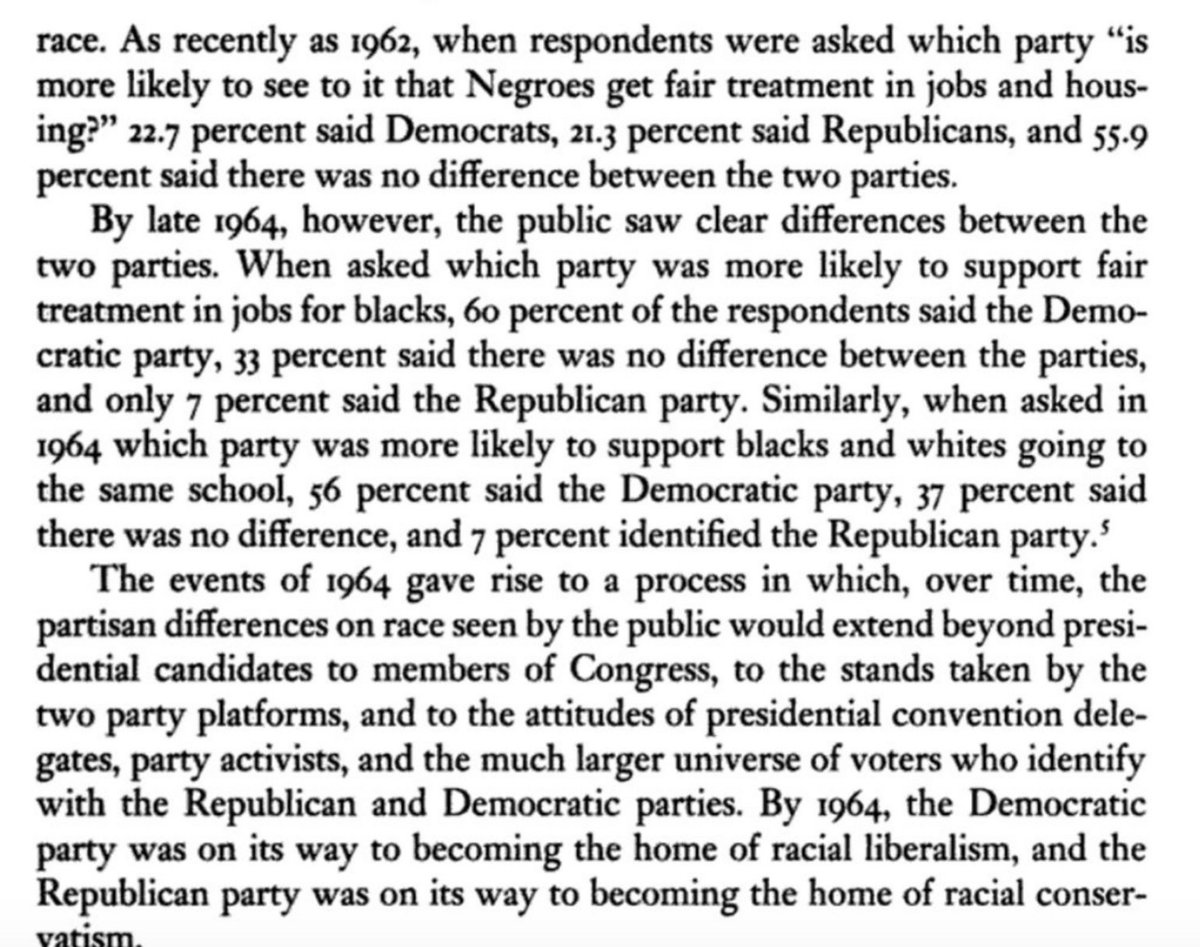
So, yes, @kilmeade, the "narrative" about the Republican Party and civil rights did "flip" in the 1960s -- largely because the Republican Party deliberately decided to flip it.
• • •
Missing some Tweet in this thread? You can try to
force a refresh








